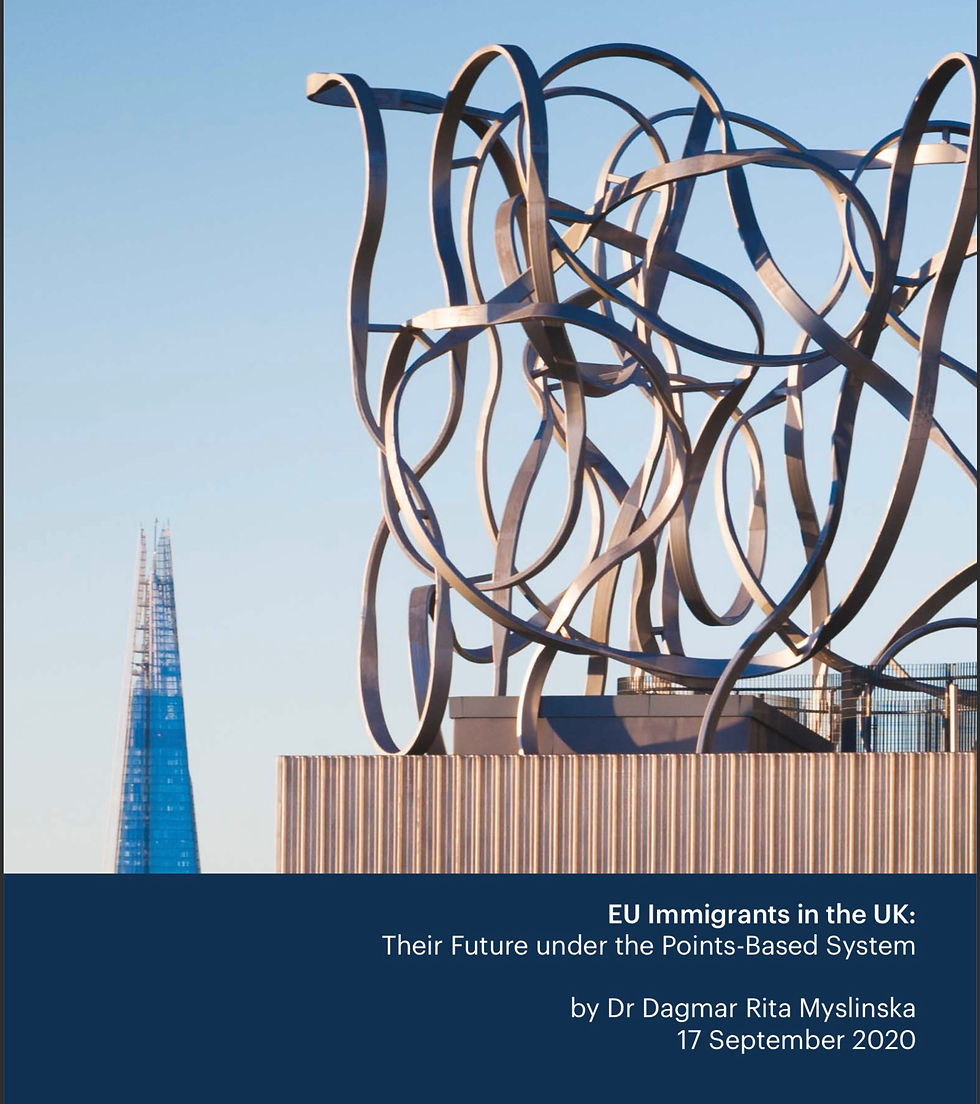BiE gives evidence at Lords' EU Justice Sub-Committee: uncertainty for EU citizens could result
- Dr Dimitrios Giannoulopoulos
- Nov 2, 2017
- 3 min read
The continuing uncertainty around the status of EU citizens living in the UK is affecting their personal, social and economic relations, and could result in claims to the European Court of Human Rights under Article 8 of the Convention, in line with existing case law coming from the Strasbourg court.
Dr Dimitrios Giannoulopoulos, Director of the Britain in Europe think tank and academic adviser to the ‘New Europeans’ civil rights group, delivered this insight when giving evidence to the Lords’ EU Justice Sub-Committee on 31 October as part of an invited panel of experts. You can watch a video of the entire proceedings here:
Article 8 of the ECHR offers protection to all residents of Europe over their right to a private and family life. Since the ‘starting pistol’ for Brexit was triggered in March 2017, EU citizens living in the UK have not had reassurance about their future status, and the existing ‘offer’ by the Prime Minister leaves many of them in limbo. This is especially in cases where EU citizens will not be able to establish permanent residence; women with young children who do unpaid work is an example.
Dr Giannoulopoulos told the committee, chaired by Baroness Kennedy of the Shaws, that the UK's failure to secure the rights of European citizens – and, conversely, the EU’s failure to secure those of UK citizens in the EU27 countries – is an oxymoron: “Negotiations over their right to stay are ongoing, even though there is a right to stay under international law, which prevents the ejection of people, and is non-negotiable.” He offered the view that “faced with the dire prospect of continued uncertainty for 5 million people, the Court would be hard pressed to actively protect their fundamental human right to private and family life”.
But Dr Giannoulopoulos also informed the committee that the European Court of Human Rights has, with time, become progressively more reluctant to interfere with the national interest in the UK. This is partly due to the ongoing debate about the UK withdrawing from the Strasbourg system and repealing the Human Rights Act. As a result, the Court might choose to defer to the UK legal framework if a claim was submitted under Article 8.
Minister for Exiting the EU, David Davis, had recently made a statement in the House of Commons suggesting that progress had been made in the Brexit negotiations with the EU. However, Dr Giannoulopoulos explained that talk about progress was immaterial when there were three major flaws in the negotiations:
- Everything depends on a deal; a 'no deal' scenario will leave EU citizens living in the UK in limbo.
- As long as negotiations continue, uncertainty continues.
- The potential expulsion of the 3.4 million EU citizens in the UK is, in reality, impossible to carry out, and might trigger retaliation from the EU27 countries – including sending 'Brits abroad' back home.
Dr Giannoulopoulos also focussed on the many gaps in the framework that the UK Government has put forward in the negotiations, following up on a critique he developed when the PM first made her 'fair and serious offer'. He explained that the 'threat' from the UK Government that the cut off point for establishing permanent residence status or 'settled status' could be set on 29 March 2017, at the time of the trigger of Article 50, and an entire two years before the final exit point of 29 March 2019, was adding unnecessary insecurity and fear, for everyone who has arrived in the UK after that date.
Baroness Kennedy quickly agreed with this point, stating that "this is people who have been offered jobs before the Referendum, and have taken posts afterwards, or after article 50 was triggered, and they are living in particular uncertainty about what their status might be".

Dr Giannoulopoulos gave evidence and answered questions alongside fellow experts Dr Kirsty Hughes of Cambridge University, Prof Stijn Smismans of Cardiff University and Ms Jane Golding of British in Europe.
Dr Giannoulopoulos’ evidence built on research he presented orally at the European Parliament in May 2017, including: part of a written submission to the Committee (with the civil rights group ‘New Europeans’); his immediate reaction to Theresa May’s ‘fair and serious’ offer on citizens’ rights (published by the ‘UK in a Changing Europe’); a joint BiE–New Europeans report published in July; and a BiE research event at the British Academy in February 2017.
The next round in the Brexit negotiations takes place next week. Considering that continuing uncertainty exacerbates the current situation, and may trigger legal claims, this is a unique opportunity for both parties to recognise that EU citizens in the UK, and British people in the EU, will be able to continue with the status quo regardless of what happens with the Brexit negotiations.






Comments